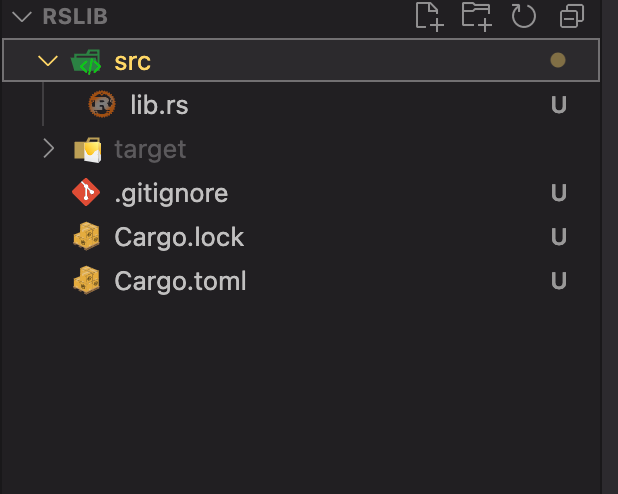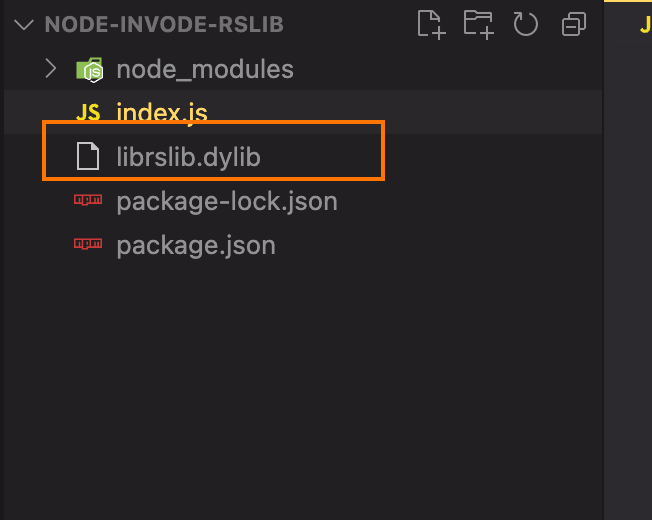Rust 动态连接库开发
一、环境要求
- 具备 nodejs 环境
- 具备 rust 编译环境
二、编写 rust 动态连接库
1. 创建 lib 类型 rust 工程
使用 cargo 直接生成 lib 类型的工程
bash
cargo new rslib --libcargo new rslib --lib目录结构 
2. 修改Cargo.toml文件内容
diff
[package]
name = "rslib"
version = "0.1.0"
edition = "2021"
# See more keys and their definitions at https://doc.rust-lang.org/cargo/reference/manifest.html
+[lib]
+crate-type = ['cdylib']
[dependencies][package]
name = "rslib"
version = "0.1.0"
edition = "2021"
# See more keys and their definitions at https://doc.rust-lang.org/cargo/reference/manifest.html
+[lib]
+crate-type = ['cdylib']
[dependencies]若还有其他需要的 dependencies 可以在[dependencies]层级下直接写依赖名=“版本号”
也可以使用 cargo 提供的安装命令安装:
bash
cargo install 依赖名cargo install 依赖名3. 在lib.rs文件中写入具体实现方法
rust
#[no_mangle]
pub extern "C" fn add(left: i32, right: i32) -> i32 {
left + right
}#[no_mangle]
pub extern "C" fn add(left: i32, right: i32) -> i32 {
left + right
}1️⃣. 使用#[no_mangle]来组织 rust 对函数名进行编译,方便在 node 中以相同的方法名调用 2️⃣. 使用 pub extern "c" 来修饰函数,定义为使用 c 语言规范接口类型 3️⃣. 函数最后返回left+right的计算结果
4.编译为动态链接库
使用 cargo 提供的命令编译为动态连接库,可以加上--release 参数,优化打包的产物
bash
cargo buildcargo build编译完成后,最终动态连接库文件路径:
debug 模式:target/debug/lib**.[dll/os/dylib]
release 模式:target/release/lib**.[dll/os/dylib]
注:windows 中后缀为 dll,linux 中后缀为 os,macos 后缀为 dylib,**为创建动态链接库是定义的名字
二. 编写 node 工程调用
1. 创建 node 工程
使用 npm 快速创建 package.json
bash
npm init -ynpm init -y创建完成后,修改package.json,使用 esmodule
diff
{
"name": "invode-rslib",
"version": "1.0.0",
"description": "",
"main": "index.js",
+ "type": "module",
"scripts": {
"test": "echo \"Error: no test specified\" && exit 1"
},
"author": "",
"license": "ISC",
"dependencies": {
"ffi-rs": "^1.0.63"
},
"devDependencies": {
"@types/node": "^20.12.7"
}
}{
"name": "invode-rslib",
"version": "1.0.0",
"description": "",
"main": "index.js",
+ "type": "module",
"scripts": {
"test": "echo \"Error: no test specified\" && exit 1"
},
"author": "",
"license": "ISC",
"dependencies": {
"ffi-rs": "^1.0.63"
},
"devDependencies": {
"@types/node": "^20.12.7"
}
}2.安装 ffi-rs 依赖
bash
npm install ffi-rsnpm install ffi-rs3.放入动态链接库文件
将前面生成的 ib**.[dll/os/dylib]文件复制过来,放到根目录下 
4.使用 ffi-rs 调用动态连接库
创建 index.js 文件,写入如下内容:
js
import { platform } from "node:os"
import { equal } from "node:assert"
import { load, DataType, open, close } from "ffi-rs"
const a = 22
const b = 100
const dynamicLib =
platform() === "win32" ? "./librslib.dll" : platform() === "darwin" ? "./librslib.dylib" : "./librslib.so"
// 首先你需要调用 open 来打开一个动态链接库并指定一个key来作为标志符在后续操作里调用
open({
library: "rslib", // key
path: dynamicLib, // path
})
const r = load({
library: "rslib", // path to the dynamic library file
funcName: "add", // the name of the function to call
retType: DataType.I32, // the return value type
paramsType: [DataType.I32, DataType.I32], // the parameter types
paramsValue: [a, b], // the actual parameter values
})
equal(r, a + b)
console.log(r)
// 当你不需要再用到这个动态链接库时,使用close来释放它
close("rslib")import { platform } from "node:os"
import { equal } from "node:assert"
import { load, DataType, open, close } from "ffi-rs"
const a = 22
const b = 100
const dynamicLib =
platform() === "win32" ? "./librslib.dll" : platform() === "darwin" ? "./librslib.dylib" : "./librslib.so"
// 首先你需要调用 open 来打开一个动态链接库并指定一个key来作为标志符在后续操作里调用
open({
library: "rslib", // key
path: dynamicLib, // path
})
const r = load({
library: "rslib", // path to the dynamic library file
funcName: "add", // the name of the function to call
retType: DataType.I32, // the return value type
paramsType: [DataType.I32, DataType.I32], // the parameter types
paramsValue: [a, b], // the actual parameter values
})
equal(r, a + b)
console.log(r)
// 当你不需要再用到这个动态链接库时,使用close来释放它
close("rslib")r即为调用动态链接库的计算结果,equal为校验结果 r 与 a+b 是否相同的方法
5.官方示例地址
https://github.com/alexcrichton/rust-ffi-examples/blob/master/node-to-rust/src/lib.rs
使用 napi-rs 开发 Rust 动态链接库
文档地址https://github.com/napi-rs/napi-rs
 cc的学习历程
cc的学习历程